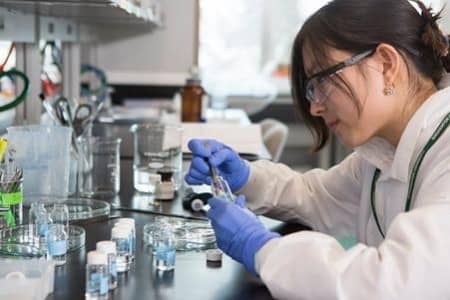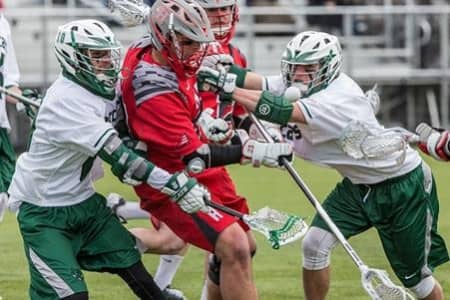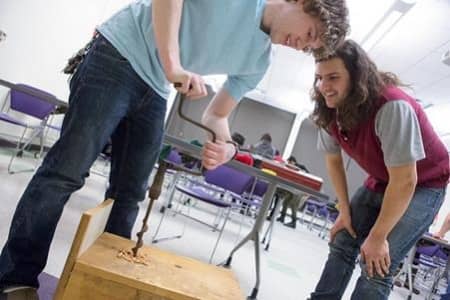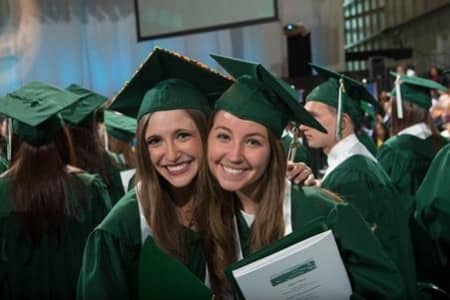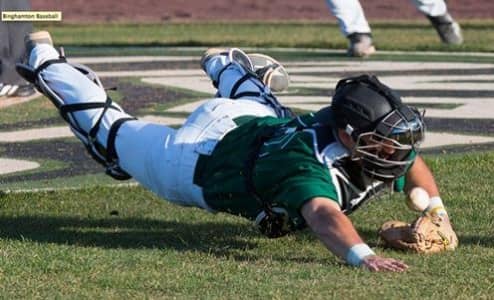Binghamton University
Binghamton, New York
Binghamton offers a wide array of personal and academic opportunities that range from international education to research initiatives. The University’s commitment to student success is of paramount importance, and students are given the tools they need to excel and make a difference.
Get to know Binghamton University
College Highlights
FIRST YEAR PROGRAM
The First Year Program at Binghamton is designed to aid students as they transition into college. Every student is required to participate, and the seminar counts for 1 credit. Students will develop their oral and written communication skills, while learning how to think critically and engage in higher level conceptualization. The First Year Experience is also a time for students to explore their interests and narrow down their options for a major. Every student will have a Discovery Advisor that will act as a mentor, facilitating discussions and guiding decisions.
EMERGING LEADERS PROGRAM
The Emerging Leaders Program (ELP) is great for students that are seeking extra leadership experience. The certificate program spans over the course of a semester and connects students with the University and community. ELP takes place the first semester of college, which allows participants to gain valuable skills early on in their college careers. All students that participate in ELP will be part of a knowledge community (KC). A KC is comprised of approximately 13 students. KCs are led by a faculty advisor, a professional staff program advisor, and peer mentors. ELP students are involved in a series of activities that promote success. They gain experience with networking and partake in leadership workshops. All of these activities lead to a service-learning project which is implemented and seen through by each KC.
GLOBAL GATEWAY
Binghamton students have the opportunity to study abroad, starting the summer after freshman year and continuing to the summer after graduation. There are plenty of programs to choose from, and many allow students to take classes within their major. Some of the programs include: Chile—Doing Business in Emerging Markets, Dominican Republic—Community Health, and Morocco—Arabic Language and North African Studies.
SERVICE LEARNING
Binghamton embraces service as part of academia. Students may choose to take service learning courses, in which a social issue is met by a community service initiative. Service hours vary by course, but they average around 15 hours a semester.
INVOLVEMENT TRANSCRIPT
The Involvement Transcript is a record of all extracurricular activities during college. This is a great way for employers to see how students have been active outside the classroom. It’s important for students to include activities in which they’ve acted as a leader, a volunteer, or even as a member of an organization. Individuals can keep a record of their activities on B-engaged, a student portal for tracking events.
ENROLLMENT BY ETHNICITY
Non-U.S. Citizen: 5%
Hispanic/Latinx: 12%
Black or African American, non-Hispanic: 5%
White, non-Hispanic: 58%
Native/Indigenous American or Alaska Native, non-Hispanic: 0%
Asian, non-Hispanic: 15%
Native Hawaiian or other Pacific Islander, non-Hispanic: 0%
Two or more races, non-Hispanic: 3%
Race and/or ethnicity unknown: 1%
THE PUBLIC SPEAKING LAB
Binghamton’s Public Speaking Lab is available to help students develop their oral communication skills. PSL consultants work with students to increase familiarity and comfort with oral presentations and public speaking. In a comfortable environment, students can practice their skills and learn how to develop them further.
THE WRITING CENTER
The Writing Center is an incredibly helpful tool, and students are highly encouraged to utilize this resource. Tutors are available to assist with any assignment across all disciplines, and they perform a wide array of services. Tutors can help students better understand an assignment, develop a thesis, and properly cite a source, to name a few.
GENERAL EDUCATION
Binghamton’s curriculum is divided into five categories, each with its own set of desired outcomes. Students are required to take courses in each of the five categories. This is to ensure that each individual graduates with all of the skills they’ll need to lead successful careers and meaningful lives.
- The first category is Language and Communication, which places a heavy emphasis on writing and speaking. Students will be expected to produce no less than twenty pages of written work, as well as two oral presentations. There is a foreign language requirement, but it can be satisfied by taking 4 units of a language in high school. Students may also bypass the requirement by receiving a 3 or higher on the AP examination.
- The second category is Creating a Global Vision. Students will develop a greater understanding of society and the factors that influence change. There is an emphasis on American culture and how our country has been shaped, changed, and affected by certain groups and ideals. Students can choose from a broad range of topics like family, religious/spiritual identities, and immigrant issues.
- Category 3 deals with natural sciences, social sciences, and mathematics. Students are required to take courses in laboratory science, math/reasoning, and social science. Together, these courses focus on the process of investigation. Students will learn to pursue a theory or hypothesis through thoughtful analysis and measurement.
- The fourth category is called “Aesthetics and Humanities.” This category explores the human condition, expression, and experience and is tied to courses like philosophy, art history, and design.
- Category 5 is Physical Activity/Wellness, which explores the factors that affect healthy lifestyles. Students must complete both the wellness and physical activity components of the category, which includes one exercise course and one course in nutrition/exercise science.
OUTDOOR PURSUITS
Outdoor Pursuits is all about getting students outside and excited about physical activity. Students partake in outdoor adventures and learn about the importance of conservation and environmental education. Students are involved in service learning efforts, team building exercises, and physical activity.
COMMUNITIES AND RESIDENTIAL COLLEGES
College-in-the-Woods (CIW): CIW is made up of 5 different buildings, each with its own suite and corridor style living arrangements. Residents of CIW have the option to join a living learning community that unites students and promotes academic success. Students that opt to join the LLC take two courses with other members of the community.
Dickinson Community: The Dickinson Community is the newest addition to Binghamton’s campus. Members of the is community have access to CoRE (Computer, Robotics and Engineering) housing.
Hinman College: Residents of Hinman College live in one of the 5 suite-style building associated with the community. Members share a passion for leadership and community service. The living learning component of the college is known as ALIVE. Participants of ALIVE work directly with the community and carry out several service projects and initiatives. Members of the LLC also have the opportunity to take service learning courses, which pair academics with community outreach.
Mountainview College: Mountainview College is made up of four residence halls, each with amenities like study rooms, central air condition, and athletic fields. There are four different living learning communities within Mountainview:
- Engineering
- Nursing
- STEAM (Science, Technology, Engineering, Art, Math)
- SALC (Social Activism)
Newing College: Newing College embraces four core principles: Civility, Ownership, Inclusion, and Newing (pride in residency). All members of Newing College promote these principles, and certain individuals are recognized for their dedication to the community. Newing considers itself to be one large living learning community, where students are given several opportunities to integrate academics into residence life.
CAREER SERVICES
Plenty of colleges and universities have career services offices, but Binghamton goes above and beyond. The office regularly holds career fairs and workshops on relevant topics like interviewing skills and resume building tips. Workshops are a great way for students to gain hands on experience and build their confidence. In so many cases, students fear their first few interviews because the pressure can be hard to handle. Binghamton calms those fears by allowing students to practice.
Admission
TEST SCORES
Optional
FRESHMAN PROFILE
SAT Evidence-Based Reading and Writing
25th Percentile: 640 | 75th Percentile: 710
SAT Math
25th Percentile: 650 | 75th Percentile: 740
ACT Composite
25th Percentile: 29 | 75th Percentile: 32
Tuition & Cost
Tuition (in-state): $7,070
Tuition (out-of-state): $24,660
Fees: $2,944
Room: $10,206
Board: $5,395
Contact Binghamton University
Contact Admissions
www.binghamton.edu/admissions
(607) 777-2171
admit@binghamton.edu
Campus Location
4400 Vestal Parkway East
Binghamton, NY 13902
(607) 777-2000
